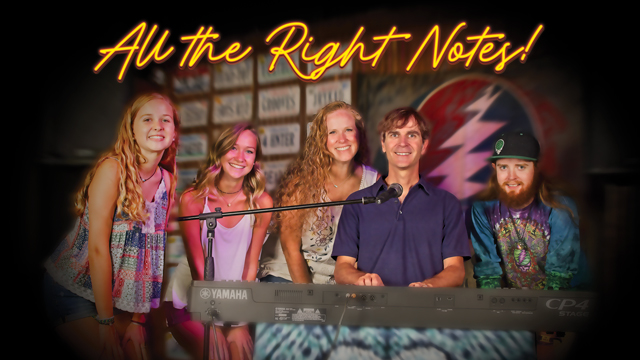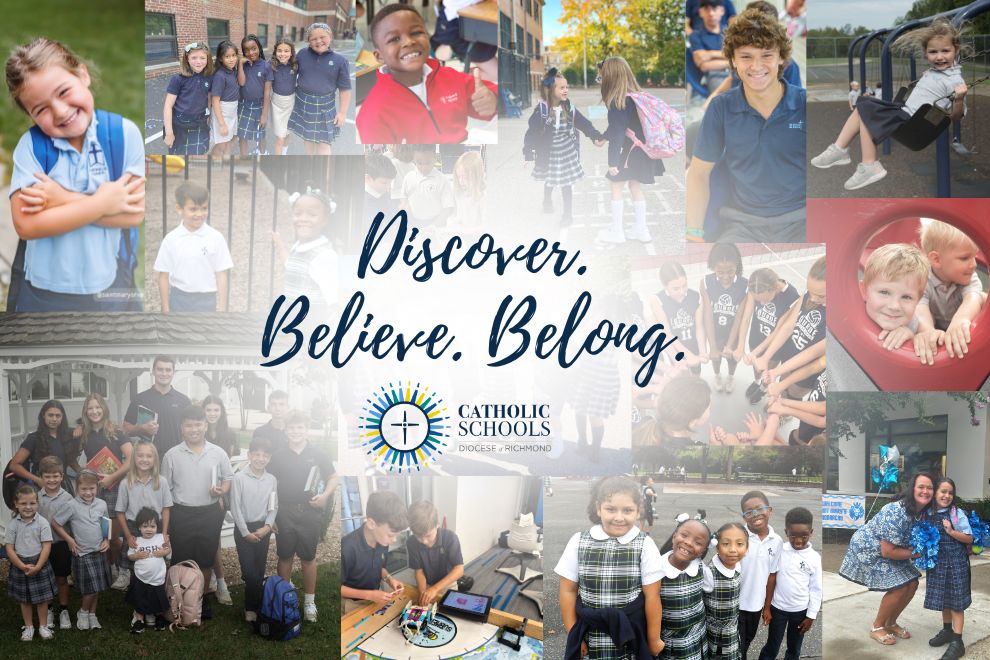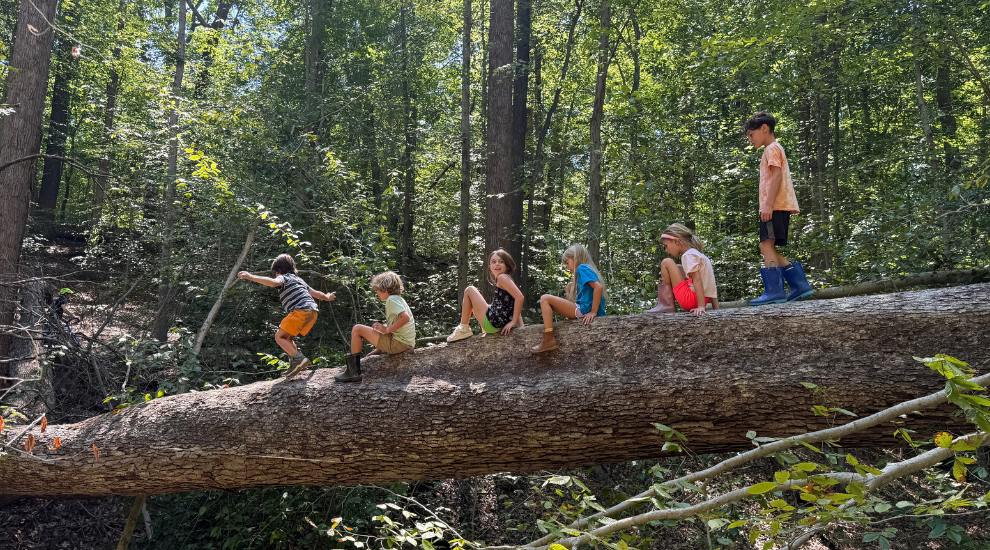Whether it’s rock-and-roll, hip-hop, country, or classical, everyone has their favorite tastes in music, with certain songs evoking memories of special times with family and friends. A shared appreciation for music can create a lasting bond for moms and dads and their children in particular.
Music is an integral part of family life for Tim and Sarah Dunkum and their three children. The Richmond couple first introduced their kids to music when they were babies. Even though they’ve grown up – Miles is twenty-two, Shae is twenty, and Willa is fifteen – the Dunkum children still love to enjoy music with their parents. The family frequently attends music festivals together and often turns out en masse to support Tim, who is a musician in four bands. One of the Dunkums’ favorite music events is Floyd Fest, a 5-day music festival held annually in the Blue Ridge Mountains featuring rock, bluegrass, reggae, folk, and other world music performers.
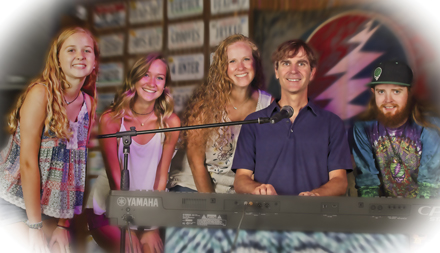
“As small children, our kids listened to whatever we were listening to,” shares Sarah Dunkum. “It was not unusual to hear one of them singing along to The Grateful Dead or quoting Bob Marley.”
Tim Dunkum, who comes from a long line of musicians, started playing piano at age eight and later took up the saxophone. He currently jams with the bands Hashbury, Last Fair Deal, Gettin’ Weir’d, and My Brother Jerry, which are mostly Grateful Dead tribute bands. Though not a musician herself, Sarah considers herself her husband’s biggest fan, and she wanted their children to also have passion for music. When they were toddlers, Sarah enrolled all three kids in Music Together, a music and movement program for newborns through kindergarten-aged kids and their parents. The Dunkums also participated in church choir and took piano lessons. Miles went on to play trumpet in middle and high school.
“It is important to us to include our children in music because it’s such a big part of who we are,” says Sarah. “It’s a great way for families with kids of all ages to spend quality time together and appreciate the gifts people have to share.”
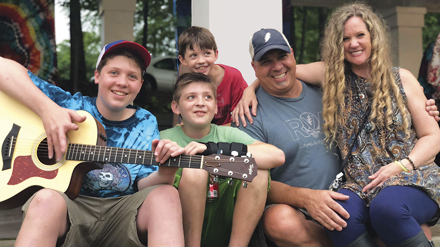
Susan Lohr, a mother of three, agrees. Last summer, Susan, her husband, and their sons opted for an unconventional family vacation. They trekked from Boston back down to Washington, DC, visiting several cities and seeing live music all along the way.
“The kids all agreed it was a lot more fun than our usual beach trips,” says Susan, whose boys are fourteen, twelve, and ten. “Music is very important to us as a family. We see some form of live music as a family on a weekly basis.”
The Lohrs have taken their children to concerts featuring local acts, as well as national artists including Bob Dylan, Phish, Weezer, Steely Dan, Counting Crows, Matchbox Twenty, The Beach Boys, ZZ Top, Willie Nelson, and other bands spanning various decades and musical genres. Their favorite band to see together is Dead & Company.
“Our kids are always surrounded by music at home, and it makes me smile to hear them singing along to the music on the radio or at the live shows, or when they ask to hear songs that have been favorites of mine for thirty years,” says Susan.
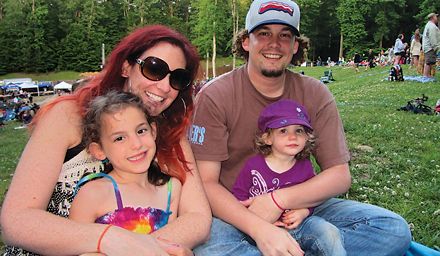
Radio authority and mother of two Melissa Chase is programming and operations manager for six radio stations in Richmond for Summit Media. Her daughters, ages nine and six, have always been surrounded by music.
“I also make sure they are being educated on their music history, not just what’s current on the radio,” Melissa says. “When they were really little, I started quizzing them on matching singers with bands. I’d call out ‘Freddie Mercury,’ and they’d yell back ‘Queen!’”
Not only do Melissa’s daughters love taking in shows with their parents, but their grandparents are part of the experience, too.
“We take them to hear Grateful Dead music – like with Dark Star Orchestra – with my parents, so it’s three generations enjoying it together,” Melissa says, adding that music appreciation has long served as a glue in her family relationships. “I hope that sharing music with them will keep us as close as my dad and I are now. He’s my festival and music buddy for a lot of shows, and I credit our sharing music when I was a kid as a big part of that bond.”
Dunkum, too, sees the important generational connection music offers. Decades ago, her husband Tim’s grandfather built and serviced pipe organs in the Richmond area. When Tim was little, he went with his grandfather to area churches to see how the pipe organs worked and help him with repairs. When he was a boy, Tim’s parents took him to the Richmond Symphony, musicals, and other live performances, and they have continued that with their grandchildren over the years. “It’s a nice way to bridge the gap between grandparent and grandchild. The love of music has been passed down from generation to generation,” Sarah says.
Benefits of Music Are Many
There are many pluses for children who are involved in music in some way, whether it is through singing, dancing, playing an instrument, or simply listening. Exposure to music aids with brain development and builds motor skills whether kids are dancing or playing a horn. Music also provides children with an outlet for creative expression, as well as expanding cultural awareness.
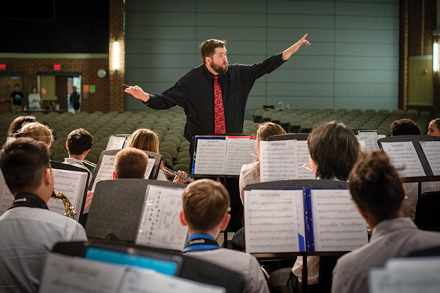
Those are all among the reasons why Todd Tinsley, band director for Hungary Creek Middle School in Henrico County, incorporates music into daily family life with his 2-year-old son.
“My grandfather and mother were both singers and used music as their mediums,” Tinsley says. “Even when my son was in the womb, I was adamant about having music around him.”
His son may not be able to fully communicate yet, but Tinsley says his son will point to the kitchen stereo when he wants to hear some music. Tinsley’s son dances whenever the radio is on and nods his head to the beat whenever he hears music outside of the home.
“We make up songs whenever we are doing something around the house, and we sing him to sleep every night,” Tinsley says. “He likes to bounce and dance around to music. Music is a connection for people and just makes everyone happier.”
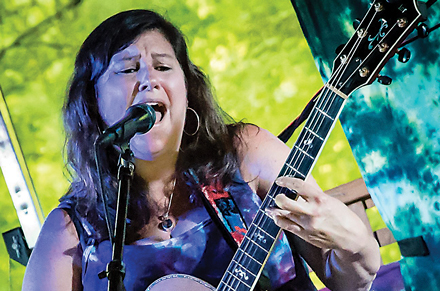
Vocalist and guitar instructor Susan DePhillip of Richmond agrees. A solo artist with several bands, including the rock band Suzie and the G-Tones and other local tribute bands, DePhillip is also the mother of three daughters ages fifteen, thirteen, and eleven.
“I can’t imagine life without music,” she says simply. DePhillip and her husband rock together in the band Blue Rooster and also host an annual music festival, The About Time Music Festival, which benefits local charities.
“The whole family gets involved in the music fest and fundraising activities,” she says. “My three girls have always been involved in music – at church, at school, and in the community.”
DePhillip’s oldest daughter participates in musical theatre, while her middle daughter is in the chorus and plays piano, and her youngest daughter plays the violin.
“We also participate together in the children’s choir, the music for vacation bible school, and Christmas productions at our church,” DePhillip shares. “I love that my girls and I are able to share this together. Our life is very busy with rehearsals and performances, but we all value the music in our lives and understand that however busy we may be, our family life is rich because of music.”
DePhillip views music as a channel for children to be heard and to help them deal with social issues and
challenges. “Music gives them an outlet to be creative and share their feelings. It also helps them socially,” says DePhillip. “Most of my daughter’s friends are involved in music in some way, too.”
Pumping up the Brain Power
There is also evidence to suggest that playing a musical instrument routinely helps children perform better academically. According to Americans for the Arts (a nonprofit arts advocacy organization), a student involved in the arts is four times more likely to be recognized for academic achievement. High school students who take four years of arts and music classes average almost one hundred points higher on their SAT scores than students who enroll in such classes for one semester or less.
Learning to play a musical instrument helps develop fine motor skills, helps with problem-solving, and can lead to stronger study habits as well as a stronger work ethic. Other benefits of music for kids include an increase in creativity, memory, accuracy, and patience, as well as a boost in confidence and self-esteem.
“There are a lot of benefits,” says Roger Novak, director of Eternity Music Academy in Richmond.
“There is brain activity as you are moving fingers, breathing air, reading music, and making motions,” Novak points out. “It also helps with coordination. There is also a lot of math involved in music as you read a time signature.”
Novak suggests that perhaps the most important benefit of learning to play an instrument is the life skills children acquire along the way.
“It helps develop self-discipline,” he says. “What I enjoy the most is challenging both my students and their parents to practice and develop that self-discipline, which I find is somewhat lacking in our culture. That self-discipline will transfer to other areas of life.” To improve any skill set, practice is crucial. That’s why Novak tells his students to practice only on the days they eat. And he’s not joking! “If you really want to get better at an instrument or anything in life, it takes diligent practice. I am a firm believer in that.”
Performing musically can offer a great sense of pride and accomplishment, but it also doesn’t hurt to fail, another life lesson that music provides. Hitting the wrong notes is par for the course in Tinsley’s band room.
“It’s important to fail,” says Tinsley. “Failure is not what defines you; it’s your response to it. It takes constant work and practice to perfect yourself. You have to appreciate the process in order to enjoy the journey. It’s amazing to watch my music students grow as performers throughout the year.”
Making Music Lovers from the Start
There are many ways parents can help instill the joy of music in their children right at home. Novak suggests playing musical games with young children. Tinsley also recommends starting small and when children are young.
“Talk to them about the music you liked growing up and what music they like,” Tinsley says. “Get a conversation started. Get them involved. If they are interested in playing an instrument, let them. See what kind of music they have within them.”
Lohr keeps a variety of instruments on hand for her sons to play.
“We have guitars, a bass, a keyboard, a drum set, a saxophone, and percussion instruments, so it’s not too quiet around here,” she says. “My favorite way to make music a part of our daily life is to just always have music playing. It’s always my preference to be listening to music or have a concert on, instead of a TV show or a movie.”
Novak echoes that sentiment.
“Turn off the TV and listen to music instead,” encourages Novak. “Listen to CDs or pull up videos of lots of different world music on YouTube. I would also suggest that families go out and listen to live music.”
The Richmond Symphony’s Union Bank and Trust Lollipop concerts offer little ones a chance to discover classical music and include interactive pre-concert activities, such as their unique instrument petting zoo. The concerts are designed for children five and up.
Local bands covering a variety of musical genres play at various indoor and outdoor venues throughout Richmond. According to Dunkum, other family-friendly live music venues to investigate include: Ashland Coffee and Tea, the Tin Pan, happy hour and daytime shows at Cary Street Cafe, brunch at the Camel, Caféspresso, outdoor venues like Innsbrook After Hours and Friday Cheers, and some breweries.
There are also national acts and bands in concert at The National, Altria Theater, the Cultural Arts Center at Glen Allen, the Dominion Energy Center, and Virginia Credit Union Live at Richmond Raceway.
Before heading to a live show, however, Chase recommends moms and dads do their homework. Parents should consider how the band acts between songs and if members swear during the performance or whether the venue may be too loud for children. Crowd size is another factor, according to Chase. If a concert is too crowded, kids won’t be able to see the stage. If families are heading to an outdoor venue, parents should be prepared. Bring a blanket or chairs, drinks and snacks, and entertainment – like cards games, bubbles, or glow sticks – for inevitable lulls in the action.
“My advice for parents when taking kids to see live music is to make it a fun experience,” Chase says. “Singing and dancing at concerts is a great way to have fun and make great memories with your family.”
Dunkum and her family have been making musical memories together for more than two decades. “Tim and I met through music, we choose to spend a lot of our free time around music, and we want to make enjoying music a family event,” says Dunkum. Many important life events and memories for our family have a song that accompany them. It’s a beautiful thing to hear a song and be reminded of a precious time.”
Photos: Scott Schwartzkopf, Loren Rosado, Jennifer Challis


